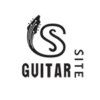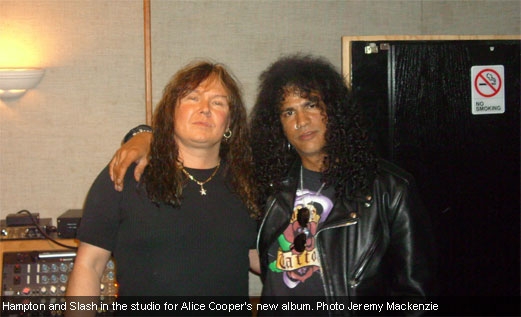Whether it is playing guitar, singing, writing, or producing, Greg Hampton certainly has it all covered. Based in Los Angeles, California, Hampton has produced such renowned rock names as Ronnie Wood, Glenn Hughes, Carmine Appice, and Jimi Hendrix’s brother, Leon Hendrix (among countless others), as well as recently producing the much-acclaimed archival Tommy Bolin releases, ‘Whips and Roses I & II.’
But 2008 is shaping up to be the year that the world is introduced to Hampton’s guitar talents. He co-produced, wrote most of, and played guitar on Alice Cooper’s new album, ‘Along Came A Spider’ (which also included a guest spot from Slash), which will be released on July 29th via SPV Records, and is also the singer/guitarist of the new space-age funk-rock band, Science Faxtion (which includes Buckethead and Bootsy Collins), whose debut album, ‘Living on Another Frequency,’ has a planned release date of August 5th via Mascot Records.
Recently, Hampton took the time out to discuss his latest projects, and offer some helpful hints for guitarists.
How is it playing with Buckethead in Science Faxtion?
Buckethead would come in with completed ideas as far as part-wise. So I would start off writing the lyrics and vocal melodies around his basic riffs. Then I would create arrangements from different parts that he would have and see what would fit with each other.
How was it fitting the guitar parts together between you two?
You’ve got to be able to listen to where to play and where not to play. The key to making that all fit together in any band is the other guy being sensitive to listening, and not just blowing your cookies all over the place and it being a train wreck. Also, if it’s a band that’s got complex musical contributions from a lot of guys, like Bucket and Bootsy, it’s pretty stiff competition when it comes to parts.
What are some of your favorite songs on ‘Living on Another Frequency’?
The song ‘Living on Another Frequency,’ Buckethead plays some amazing guitar stuff – some of the most blazing and ear-burning guitar riffs you’ve ever heard. But then on the song ‘Take You Down,’ he plays the most soulful, bluesy riffs, where he and I trade off, and I’m playing more of an electronic element of the guitar – crazy effects – and he’s playing more of the traditional blues things, which I’ve been known more for doing. It’s got a lot of shredding guitar.
There’s another song called ‘Gone Tomorrow’ which Buckethead and I had written which is a ballad – a mid-tempo Red Hot Chili Peppers/Peter Gabriel kind of thing, and he plays some really clean guitar tones. There’s a song called ‘At Any Cost,’ which I played some very ‘outside’ guitar motifs and parts. A song called ‘Take You Down,’ I’m really pleased with my guitar. ‘Life is in Deliver,’ I’m really pleased with the guitars on that.
Which guitars did you use on ‘Living on Another Frequency’?
I used a lot of different guitars on this record. Some guitars are tuned a full step down to D, some stuff was in E flat, some stuff was written by Buckethead in a unique tuning. There were no real rules on this whatsoever. That’s the catch; trying to figure out what king of chords Buckethead comes up with too, because it’s hard to follow. He used primarily a Les Paul, but I used a lot of a 2001 Firebird, a custom Stratocaster built by Eric Chaz in Van Nuys, it has a 1972 Telecaster neck on it, similar to the Tommy Bolin set-up. It’s sea foam green, and has Seymour Duncans in it, it has a Fernandes Sustainer, and a kill switch built into it. As far as the origin of the body, what year it is, is anybody’s guess.
There’s some ‘80s Les Pauls we used. One Les Paul I used has a JB in the bridge and a P-90 in the neck. Also, the Dean guys gave us guitars; it was a Dean Custom Shop 1977 Explorer. And I use Seymour Duncan pick-ups primarily, the Pearly Gates and the JB’s.
What about amps and effects?
The amps I used were a Marshall JCM-2000, an early 5150, one of the first hundred they’d made. A really old Kustom Tuck and Roll, a sparkly one that’s a 50-watt. As far as effects, I used the Whammy Pedal by Digitech, which Buckethead uses a lot. A DiscumBOBulator pedal, which is made by a company in Sweden called Ema, it’s really great for funky stuff.
I also used the Moogerfooger pedal quite a bit, and a Voodoo Labs JCX switcher, so all the stomp boxes are individually plugged in and wired. I use a Kaoos Pad sometimes on some of these songs. I’ve got an entire room full of distortion pedals and stomp boxes.
Which guitars did you play on Alice Cooper’s ‘Along Came A Spider’?
On the Alice Cooper record, Danny Saber and I co-produced it, and played about 90% of the guitars on the record. Guitar-wise, I used a lot of Firebirds on that, a lot of Les Pauls as well. Danny used a ‘50s Gold Top Les Paul on a few things, I played Danny’s Goldtop on a few things as well. We used some old Epiphone Casinos with P-90s in them.
I used a Stratocaster on some of the heavier songs, like there’s a song called “Vengeance is Mine,” and Alice wanted a real Hendrix-y guitar solo on it, so I used a Stratocaster and there’s a lot of feedback. It’s a real chaotic solo. I’ve got half a dozen guitars that are tuned a full step down, and I use DR strings that are the 46’s through 11’s on those, and then I have another 15 guitars that are tuned to pitch. I was really going for a ‘Billion Dollar Babies’ meets ‘Brutal Planet’ thing on that record.
How do you compare playing in Science Faxtion to the Alice Cooper album?
I was just finishing Science Faxtion when I started writing songs for Alice. I went from a concept record about living in the future in 2099, to writing songs for an icon like Alice Cooper about serial killers [laughs]. I really listened to ‘Billion Dollar Babies’ a lot. I really stayed away from listening to any other music, except some of his older records, and also I listened to ‘Brutal Planet,’ and a really great record that didn’t get enough recognition, ‘Last Temptation.’ I listened to the sounds on those records, some of the orchestration, string arrangements, and horn parts.
I played those songs for other producers that are friends of mine, like Scott Humphrey, and he felt I was definitely on the right track as far as the sounds. I was using a lot of front pick-up, buttery tones on some of that stuff, and some of the heavier songs, like “Vengeance is Mine,” that was one of my suped up custom made Stratocasters, and I used a Fox Tone Machine Fuzz Box, which is a real retro ‘70s Fuzz box. It’s amazing, it just screams.
Production tips for guitarists?
Don’t get locked into thinking using big amplifiers or playing so loud that your ears bleed is the case. That’s not the all-end answer. Some of the best guitar sounds that I’ve ever gotten were on little amplifiers with eight or ten inch speakers. Like, I’ll use a little Fender or VOX amp. Some of the biggest sounds on the Alice Cooper and Science Faxtion records were from a little amp. The same with Supros. Jimmy Page used those exclusively for those Led Zeppelin records, they weren’t Marshalls.
There are some definite pluses into varying your creative approach. I’ll print in ProTools a clean signal at the same time that I record the amp signal, and then I can re-amp the clean signal 30 different ways if you want. And you’ve got guitars big enough that you can take over New England!
ProTools recording tips?
Don’t get all caught up working inside the computer. I try to use a ProTools computer as like a tape machine. People use these ProTools units for everything. Always use mic’d pre’s, compressors, and go through actual real gear. If you use ProTools more like a tape machine, you’re going to have a better sounding record.
Try to use more things with tubes in it. Not just the amplifiers, but mic pre’s, because it’s going to sound warmer. You’re always going to get a better sound. That’s one of the things you’ll always find if you go on Ebay or Craig’s List, you can find some of the coolest gear, because the real drag is some of the coolest gear that is made by these companies gets discontinued within a very short period of time. They can’t stay in business with the normal, every day consumer. So producers and engineers are not going to keep a company in business. There’s maybe 3% of people that will dig that gear, and then the other 97% of the buying public, it’s over their heads. You can really find some cool stuff.
I heard you’re planning a Tommy Bolin tribute album?
I’m going to be getting started on that. I hope to get guys like Jeff Beck, Warren Haynes, Slash, Joe Perry. That’s on our wish list of who we would like to have on this record. It’s going to be all those guys that were influenced by Tommy Bolin playing with Tommy Bolin. I’ve got the multitracks; they’ll be jamming with Tommy. It’s never been done in that capacity, where they’re actually going to be interacting with a guy that passed away nearly 30 years ago. I’m anticipating it will take six to eight months to record it – its release will be more like 2009.


my name is greg hampton too
‘Along Came A Spider’ is AC’s best, most creative work in at least two decades. Thanks for your part in making this album happen.
my name is greghampton too man thats awsome
this better be a good Alice album. i could have lived with out another B.P. or D.T. but what ever, as long as it reminds me of older album then those two. much older!
,R
Alice Cooper rules. His 70’s albums are classics of course, but some of his best work has come from 1994 to the present. Everything from the Last Temptation to the present is an absolute joy to listen to. This new record sounds like vintage Alice. If you haven’t heard stuff like Brutal Planet or The Last Temptation, you don’t like hard rock. It is time to acquainted with the Coop.